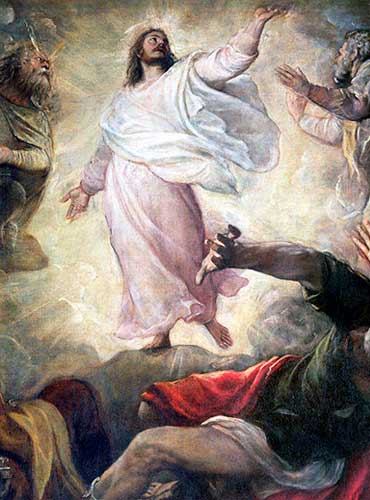Second Sunday of Lent – Year A
Gn 12:1-4a; Ps 33:4-5,18-20,22; 2 Tim 1:8b-10; Mt 17:1-9
Today we celebrate the second Sunday of Lent, and the gospel of this Sunday is always the gospel of the Transfiguration of Jesus. Tradition holds that the Transfiguration took place forty days before the Passion, and therefore we always remember this event at the beginning of Lent.
But beyond this tradition, we can ask about the Transfiguration itself: why was Jesus transfigured, why in that place, why in the presence of Moses and Elijah? Why? So, today we can think a little about the Transfiguration to better understand this event, and then we can think about how it applies to our lives.
Now, why was Jesus transfigured? Today’s liturgy explains the event in the preface, or in the prayer that the priest says before we sing the Holy, holy, holy. In a few minutes, we will hear these words: For after [Christ] had told the disciples of his coming Death, on the holy mountain he manifested to them his glory, to show, even by the testimony of the law and the prophets, that the Passion leads to the glory of the Resurrection. Only through passion can we reach the triumph of the resurrection.
We know, as St. Thomas Aquinas says, that Our Lord, after foretelling His Passion to His disciples, had exhorted them to follow the path of His sufferings. Now in order that anyone go straight along a road, he must have some knowledge of the end: thus an archer will not shoot the arrow straight unless he first see the target. Hence Thomas said: “Lord, we do not know where you are going; how can we know the way?” Above all is this necessary when hard and rough is the road, heavy the going, but delightful the end. Now by His Passion Christ achieved glory, not only of His soul, which He had from the first moment of His conception, but also of His body; according to Luke (24:26): “Christ ought to have suffered these things, and so to enter into His glory (?).” Therefore it was fitting that He should show His disciples the glory of His clarity (which is to be transfigured), to which He will configure those who are His; according to Philippians 3:21: “(Who) will reform the body of our lowness configured to the body of His glory.” By His loving foresight He allowed them to taste for a short time the contemplation of eternal joy, so that they might bear persecution bravely.”
The glory of Jesus, the glory that He has shown us on the mountain, will be our glory. This is a teaching that must fill us with joy and hope; it is a teaching that we cannot doubt, because it is very certain. And for this Jesus chose the mountain to be the place of the Transfiguration. In the Bible, the mountains are always the place of the most important and most intimate contacts with God. We think in the mountain where Abraham thought of making the sacrifice of his son Isaac, in the mountain where Moses received the ten commandments, in the mountain where Elijah killed the priests of Baal, or even in the mountain of the Beatitudes and mount Calvary in the life of Jesus. Here too, on this mountain, Jesus told us a lesson of great importance: that we must not fix our attention on the problems and difficulties, but on our end, which is to be like Jesus.
This is why Jesus chose Moses and Elijah to appear with him, because they spoke with him about his passion and death. Then, “to confirm the soul of his disciples in this regard”, he chose those who had exposed their lives for God: Moses in fact with the risk of his life had presented himself to Pharaoh, and Elijah to King Ahab, and also to show that Jesus it had been foretold by the law, given by Moses, and to the prophets, among whom Elijah occupies the first place. It is always the same teaching: those who want to follow God must suffer; this has always been teaching. This is the lesson for us.
We have already quoted the words of Saint Paul, speaking of the Transfiguration. He said that Jesus will transfigure our lowly bodies to conform them to his glorious body. But it is important to understand the context. He says: For many, as I have often told you and now tell you even in tears, conduct themselves as enemies of the cross of Christ. Their end is destruction. . . . Their minds are occupied with earthly things. But our citizenship is in heaven, and from it we also await a savior, the Lord Jesus Christ. He will change our lowly body to conform with his glorified body.
So what should we do? Elsewhere in the same letter Saint Paul tells us: Rejoice in the Lord always. I shall say it again: rejoice! Have no anxiety at all, but in everything, by prayer and petition, with thanksgiving, make your requests known to God. Finally, whatever is true, whatever is honorable, whatever is just, whatever is pure, whatever is lovely, whatever is gracious, if there is any excellence and if there is anything worthy of praise, think about these things. Rejoice, do not worry, make your requests to God, and think and love what is good.
Our lives are full of difficulties. God knows this. He knows it perfectly, and for this reason he indicated to the apostles and to us that only through passion can we reach the triumph of the resurrection.
We ask through the intercession of Mary Most Holy, Our Lady of Sorrows, to obtain for us the grace to seek the things above, where Christ is seated at the right hand of God and to think of the things above, not those of the earth.






